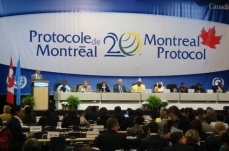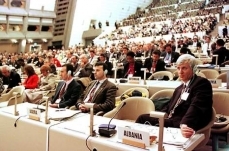International (Policy Solutions, Climate Change) (main)
From The Encyclopedia of Earth
International (Policy Solutions, Climate Change)
Temple of the Golden Pavilion in Kyoto, Japan. Kyoto was the site of the Kyoto Protocol that was negotiated in 1997 to limit greenhouse gas emissions from industrialized countries.
Keith Pomakis
Global (main) |
Multinational (main) |
========
-
 Featured Article
Featured Article  World Environment Day: 5 June 2012World Environment Day (WED) is an annual event thatis aimed at being the biggest and most widely celebrated global day for positive environmental action. World Environment... More »
World Environment Day: 5 June 2012World Environment Day (WED) is an annual event thatis aimed at being the biggest and most widely celebrated global day for positive environmental action. World Environment... More »
-
 Featured News Article
Featured News Article  A World Environment Organisation?Zakri Abdul Hamid, Science Advisor to the Prime Minister of Malaysia, notes in SciDev.Net on 5 January 2012 that "The proposed UN World Environment Organisation is badly... More »
A World Environment Organisation?Zakri Abdul Hamid, Science Advisor to the Prime Minister of Malaysia, notes in SciDev.Net on 5 January 2012 that "The proposed UN World Environment Organisation is badly... More »
-
 Featured Article
Featured Article  Africa (collection) (International (Policy Solutions, Climate Change))Welcome to the Africa Collection! This new collection is centered on the environmental, economic and social challenges faced by the people of Africa. The goal of this collection... More »
Africa (collection) (International (Policy Solutions, Climate Change))Welcome to the Africa Collection! This new collection is centered on the environmental, economic and social challenges faced by the people of Africa. The goal of this collection... More »
-
 Featured Article
Featured Article  International Climate TreatiesThe Kyoto Protocol has achieved only limited success in slowing the rise in atmospheric concentrations of greenhouse gases. [1], [2], [3] Similarly, although the Law of the Sea... More »
International Climate TreatiesThe Kyoto Protocol has achieved only limited success in slowing the rise in atmospheric concentrations of greenhouse gases. [1], [2], [3] Similarly, although the Law of the Sea... More »
-
 Featured Article
Featured Article  The Montreal ProtocolChlorofluorocarbons (CFCs) and hydrochlorofluorocarbons (HCFCs) are chemicals that were once the main ingredients of refrigerants, aerosol spray propellants, cleaning solvents,... More »
The Montreal ProtocolChlorofluorocarbons (CFCs) and hydrochlorofluorocarbons (HCFCs) are chemicals that were once the main ingredients of refrigerants, aerosol spray propellants, cleaning solvents,... More »
-
 Featured Article
Featured Article  The Kyoto ProtocolIn 1992, concern over rising, human-induced greenhouse gas concentrations in the atmosphere prompted the United Nations Framework Convention on Climate Change (UNFCCC) treaty... More »
The Kyoto ProtocolIn 1992, concern over rising, human-induced greenhouse gas concentrations in the atmosphere prompted the United Nations Framework Convention on Climate Change (UNFCCC) treaty... More »
Recently Updated
 World Environment Day: 5 June 2012 Last Updated on 2015-05-02 13:16:57 World Environment Day (WED) is an annual event thatis aimed at being the biggest and most widely celebrated global day for positive environmental action. World Environment Day activities take place all year round but climax on 5 June every year, involving everyone from everywhere. The theme of WED 2012 is "Green Economy: Does it include you?" World Environment Day celebration began in 1972 and has grown to become the one of the main vehicles through which the UN stimulates worldwide awareness of the environment and encourages political attention and action. Through World Environment Day, the UN Environment Programme is able to personalize environmental issues and enable everyone to realize not only their responsibility, but also their power to become agents for change in support of sustainable and equitable development. World Environment Day is also a day for people... More »
World Environment Day: 5 June 2012 Last Updated on 2015-05-02 13:16:57 World Environment Day (WED) is an annual event thatis aimed at being the biggest and most widely celebrated global day for positive environmental action. World Environment Day activities take place all year round but climax on 5 June every year, involving everyone from everywhere. The theme of WED 2012 is "Green Economy: Does it include you?" World Environment Day celebration began in 1972 and has grown to become the one of the main vehicles through which the UN stimulates worldwide awareness of the environment and encourages political attention and action. Through World Environment Day, the UN Environment Programme is able to personalize environmental issues and enable everyone to realize not only their responsibility, but also their power to become agents for change in support of sustainable and equitable development. World Environment Day is also a day for people... More »  A World Environment Organisation? Last Updated on 2013-08-17 12:00:07 Zakri Abdul Hamid, Science Advisor to the Prime Minister of Malaysia, notes in SciDev.Net on 5 January 2012 that "The proposed UN World Environment Organisation is badly needed to give poor countries a strong voice in green policy". The United Nations will be convening in Rio de Janeiro, Brazil, next June to commemorate the 20th anniversary of the Earth Summit, held in the same city. The Rio+20 conference will assess progress since 1992 and aim to secure renewed political commitment to sustainable development. One of the priorities is recognising that current governance systems to protect the environment have failed to meet expectations — indeed, the health of our environment has taken a turn for the worse over the past decades. World leaders must recognise that taking the modest and incremental approach they took in Rio, 20 years ago is not enough. Only a major... More »
A World Environment Organisation? Last Updated on 2013-08-17 12:00:07 Zakri Abdul Hamid, Science Advisor to the Prime Minister of Malaysia, notes in SciDev.Net on 5 January 2012 that "The proposed UN World Environment Organisation is badly needed to give poor countries a strong voice in green policy". The United Nations will be convening in Rio de Janeiro, Brazil, next June to commemorate the 20th anniversary of the Earth Summit, held in the same city. The Rio+20 conference will assess progress since 1992 and aim to secure renewed political commitment to sustainable development. One of the priorities is recognising that current governance systems to protect the environment have failed to meet expectations — indeed, the health of our environment has taken a turn for the worse over the past decades. World leaders must recognise that taking the modest and incremental approach they took in Rio, 20 years ago is not enough. Only a major... More »  U.S. Antarctic Program Blue Ribbon Panel Report Last Updated on 2012-07-24 00:00:00 U.S. Antarctic Program Blue Ribbon Panel Report In 2011, the Office of Science and Technology Policy and the National Science Foundation initiated a major review of the U.S. Antarctic Program to examine U.S. logistical capabilities likely to be needed in Antarctica and the Southern Ocean during the next two decades and to seek ways to enhance logistical efficiency to support world-class science. The Panel conducted an independent review of the current U.S. Antarctic Program to identify and characterize a range of options for supporting and implementing the required national scientific endeavors, international collaborations, and strong U.S. presence in Antarctica. Now, the 12-member Panel has released its report, More and Better Science in Antarctica through Increased Logistical Effectiveness. The report is a comprehensive document based on several months of research,... More »
U.S. Antarctic Program Blue Ribbon Panel Report Last Updated on 2012-07-24 00:00:00 U.S. Antarctic Program Blue Ribbon Panel Report In 2011, the Office of Science and Technology Policy and the National Science Foundation initiated a major review of the U.S. Antarctic Program to examine U.S. logistical capabilities likely to be needed in Antarctica and the Southern Ocean during the next two decades and to seek ways to enhance logistical efficiency to support world-class science. The Panel conducted an independent review of the current U.S. Antarctic Program to identify and characterize a range of options for supporting and implementing the required national scientific endeavors, international collaborations, and strong U.S. presence in Antarctica. Now, the 12-member Panel has released its report, More and Better Science in Antarctica through Increased Logistical Effectiveness. The report is a comprehensive document based on several months of research,... More »  Global Environmental Outlook: Fifth Edition Last Updated on 2012-06-06 00:00:00 The United Nations Environment Programme notes that the world remains on an unsustainable track despite hundreds of internationally agreed goals and objectives. An ambitious set of sustainability targets can be met, but only with renewed commitment and rapid scaling-up of successful policies. Global Environmental Outlook: Fifth Edition The world continues to speed down an unsustainable path despite over 500 internationally agreed goals and objectives to support the sustainable management of the environment and improve human wellbeing, according to a new and wide-ranging assessment coordinated by the United Nations Environment Programme (UNEP). The fifth edition of the Global Environmental Outlook (GEO-5), launched on the eve of the Rio+20 Summit, assessed 90 of the most-important environmental goals and objectives and found that significant progress had only been made in... More »
Global Environmental Outlook: Fifth Edition Last Updated on 2012-06-06 00:00:00 The United Nations Environment Programme notes that the world remains on an unsustainable track despite hundreds of internationally agreed goals and objectives. An ambitious set of sustainability targets can be met, but only with renewed commitment and rapid scaling-up of successful policies. Global Environmental Outlook: Fifth Edition The world continues to speed down an unsustainable path despite over 500 internationally agreed goals and objectives to support the sustainable management of the environment and improve human wellbeing, according to a new and wide-ranging assessment coordinated by the United Nations Environment Programme (UNEP). The fifth edition of the Global Environmental Outlook (GEO-5), launched on the eve of the Rio+20 Summit, assessed 90 of the most-important environmental goals and objectives and found that significant progress had only been made in... More »  IPCC Working Group III Last Updated on 2011-07-12 00:00:00 Working Group III (WG III) of the IPCC focuses its work on the mitigation of climate change. The IPCC has the responsibility of providing policy makers with objective scientific and technical findings that are policy relevant but not policy prescriptive. The IPCC is aimed at serving as an honest broker between science and policy makers and other relevant stakeholders. The IPCC WG III assesses all relevant options for mitigating climate change through limiting or preventing greenhouse gas (GHG) emissions and enhancing activities that remove them from the atmosphere. WG III analyses the costs, benefits and risks of the different approaches to mitigation, considering also the available domestic instruments and policy measures as well as international arrangements. It is responsible for producing reports as part of IPCC's multi-volume Assessments. IPCC Assessments... More »
IPCC Working Group III Last Updated on 2011-07-12 00:00:00 Working Group III (WG III) of the IPCC focuses its work on the mitigation of climate change. The IPCC has the responsibility of providing policy makers with objective scientific and technical findings that are policy relevant but not policy prescriptive. The IPCC is aimed at serving as an honest broker between science and policy makers and other relevant stakeholders. The IPCC WG III assesses all relevant options for mitigating climate change through limiting or preventing greenhouse gas (GHG) emissions and enhancing activities that remove them from the atmosphere. WG III analyses the costs, benefits and risks of the different approaches to mitigation, considering also the available domestic instruments and policy measures as well as international arrangements. It is responsible for producing reports as part of IPCC's multi-volume Assessments. IPCC Assessments... More » 

